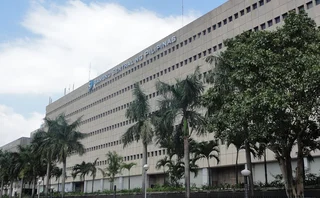
Payment services: CMA
Swedish payments firm is now key player in new payment system linking the Arab world and beyond

Central banks around the world are hard at work upgrading payment systems. Urged on by consumer demand and pressure from private initiatives, including stablecoins and other crypto assets, many are implementing the next generation of core payments infrastructure. In parallel, central banks and global organisations are working to overcome the limitations of cross-border payments, which typically remain costly and slow.
A technology provider whose systems lie at the heart of these initiatives is CMA Small Systems. The Swedish company provides payments infrastructure in over 60 countries, processing daily volumes worth more than $300 billion. The past year has been a busy one, as CMA implemented projects for central banks in Kuwait, the Kyrgyz Republic and the Philippines, as well as signing deals to provide fast payment systems for Paraguay and Pakistan.
On top of its work providing critical domestic infrastructure, CMA broke new ground in 2020 and 2021 with its provision of the infrastructure behind the Buna cross-border payment system, which is operated by the Arab Monetary Fund. Buna is a multi-currency system that allows banks in different countries to easily exchange funds across borders.
“The idea is to allow users to send payments between commercial banks participating in the system, online and immediately,” Igor Kozintsev, a vice-president at CMA, explains.
“Correspondent banks are still needed to fund and defund accounts during the payments process, but Buna processes payments directly between originating and receiving banks without the need for chains of intermediaries between them. It currently offers payments in six currencies – Emirati dirhams, Egyptian pounds, Jordanian dinars and Saudi riyals, plus US dollars and euros – with more planned.”

“With Buna, we are trying to make payments faster because we are interconnecting real-time payment systems,” says Maxim Neshcheret, CMA’s director for the Asia-Pacific region. “It is cheaper because we eliminate extra steps. The Buna model itself is based on cost recovery. We are trying to make access to cross-border payments inclusive.”
Buna chief executive officer Mehdi Manaa says CMA won the contract partly because the firm is well known in the central banking community, and already provides the infrastructure for real-time gross settlement (RTGS) systems operated by several Buna members. He adds that CMA has good knowledge of the region and a strong network of contacts among key stakeholders.
CMA launched the platform behind Buna in February 2020. The next step was to onboard the first batch of currencies, which happened in late 2020. Onboarding of participants began in the first quarter of 2021, a process that began slowly and is now “booming”, says Manaa. He notes that the system needs to build up a wider network of banks before volumes rise, but says there has been a “very positive increase” in the number of participants in the past year.
While building the network remains the primary focus, Buna’s operators are already looking beyond the region. A trial with the Bank of Italy showed Buna could connect to the eurozone’s Tips fast payment system, and plans are also afoot to build connections into Asia and Africa.
“We see CMA really as a partner, not just a provider,” says Manaa. He adds that the firm’s global network of contacts is likely to prove highly valuable in supporting Buna’s future expansion.
‘Any time of the day or night’
Another major project that came to fruition in 2021 was the Central Bank of the Philippines’ (BSP) new RTGS system. The platform is compliant with the ISO 20022 payment messaging standard, allowing richer transfers of payment information, while helping the RTGS system to connect more easily to other payment systems domestically and internationally. It also benefits from stronger security.
The new RTGS system went live in a ‘big-bang’ implementation in July 2021. The launch was delayed a month because several banks needed more time to prepare for the switchover, and the coronavirus pandemic added further complexity to the project. “It was a very challenging time for us,” recalls Remy Macapinlac, an official at BSP who was closely involved in the payments project.

BSP chose CMA over several rivals that also tendered for the project because the firm was best able to meet the technical requirements, even though it was not the cheapest bidder.
Although the launch was delayed, BSP had allowed for three months extra, when only one was ultimately needed. CMA helped the central bank organise the many industry players by implementing a project tracker, requiring financial institutions to submit monthly reports on their progress to ensure problems could be caught and solved early. The firm also helped with a market rehearsal ahead of the big bang.
Jay Dizon, director of BSP’s payment and settlement systems department, says the CMA team was “very co-operative” in providing support “any time of the day or night we needed them”.
After months of intensive preparations, the launch went smoothly. Dizon says other central banks in the region that are working towards RTGS upgrades are now considering the big-bang model, rather than a sequential approach. “We are very happy with CMA’s work,” he says. “Everything went according to plan.”
The Central Banking Awards were written by Christopher Jeffery, Daniel Hinge, Dan Hardie, Victor Mendez-Barreira, Ben Margulies and Riley Steward
Only users who have a paid subscription or are part of a corporate subscription are able to print or copy content.
To access these options, along with all other subscription benefits, please contact info@centralbanking.com or view our subscription options here: www.centralbanking.com/subscriptions
You are currently unable to print this content. Please contact info@centralbanking.com to find out more.
You are currently unable to copy this content. Please contact info@centralbanking.com to find out more.
Copyright Infopro Digital Limited. All rights reserved.
As outlined in our terms and conditions, https://www.infopro-digital.com/terms-and-conditions/subscriptions/ (point 2.4), printing is limited to a single copy.
If you would like to purchase additional rights please email info@centralbanking.com
Copyright Infopro Digital Limited. All rights reserved.
You may share this content using our article tools. As outlined in our terms and conditions, https://www.infopro-digital.com/terms-and-conditions/subscriptions/ (clause 2.4), an Authorised User may only make one copy of the materials for their own personal use. You must also comply with the restrictions in clause 2.5.
If you would like to purchase additional rights please email info@centralbanking.com




